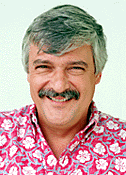


THERE'S a modest sort of charm about state Rep. Calvin Say that easily explains how he has stayed in office since 1976. He has remained so long not by shining a spotlight on his accomplishments, but by being the guy who always volunteered to go find the extension cord for the light. How modest Calvin Say
became speakerHis campaigns were a model in self-effacement. But his hold on his Palolo district was sure enough that in 1990, 1988, 1984 and 1982 he ran without opposition.
For years, Say was regular fodder for feature writers. He continued to work in the kitchen at Flamingo Chuckwagon despite his election. He alternated between presiding over the state's budget for culture and arts and marching the dirty dishes into the sink at the Kapiolani Boulevard restaurant.
Since then, Say has become the vice president and office manager for an import-export business and has just graduated from Finance Committee chairman to speaker of the House.
He's no overnight success. Say assumes the speakership after serving in a progression of increasingly more critical positions in the House. He moved from vice chairman to chairman of the Finance Committee when Maui Rep. Joe Souki won the speakership.
The last move was triggered by Souki's leadership problems, first apparent when the House Democrats overrode his position on Bishop Estate trustees' compensation. After the election the problems became too big to ignore.
Even Gov. Ben Cayetano criticized Souki's defense of the Bishop Estate and the veteran Democrat's handling of a real estate deal with the estate.
Say was a good soldier through the last session's turmoil. So when legislators asked, "If not Souki, then who?" it was easy to answer with Say's name.
Unlike previous sessions, Say's transition was orderly and, if not scripted, at least rational. Souki, after counting the votes in the Democratic caucus, decided to nominate Say for the leadership position.
The campaign for the speakership, like the new speaker himself, was deliberate, low-key and business-like.
The question now, of course, is what is this going to mean. Say has already proposed elevating his vice chairwoman, Rep. Bertha Kawakami, to Finance chairwoman.
Say has repeated his proposal to lower the state excise tax by taxing nonprofits. The position may make financial sense, but it is not likely to be politically popular.
Say's other major problem next year will be balancing the needs of small business and big labor.
Some of the factions that supported Say did so in reaction to Souki's removal of pro-labor Dwight Takamine as chairman of the Labor Committee. It will be up to Say to move to the center while keeping labor happy.
AFTER sitting as vice chairman and chairman of the Finance Committee, Say is most attuned to a balanced budget. If his members want new programs, he has to find a way to get the extra money. If the administration wants to change spending priorities, Say has to find a way to make it all fit.
If some politicians are happy only with new programs and new services, Say is one of those grounded in technical realities of the state's budget. He is also a strongly partisan Democrat, coming from a Democratic stronghold.
It should then be expected that Say will follow a path of disposing of plans presented to him, rather than proposing new ways to solve Hawaii's problems.
Richard Borreca reports on Hawaii's politics every Wednesday.
He can be reached by e-mail at rborreca@pixi.com